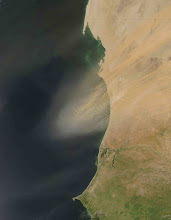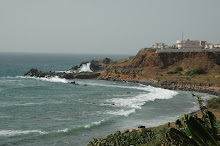Tuesday, September 16, 2008
Speaking of Watergate
Two friends from outside the class joined me, and we waited in line together for hours. Dick Cavett, the intellectual and witty late night talk show host of the era (and the Tonight Show's first real competitor), walked by at one point. So did other celebrities I've since forgotten. Apparently a Time magazine photographer stopped by, too, because in the next issue, an article on the hearings sported a photo showing me and my two buddies sitting on the floor around the perimeter of a circular entryway to the Capitol building. (I saved a copy of that issue for a long time, but lost track of it some years ago.)
We had been warned that the hearings would probably be boring, and the warnings were apt. The proceedings that we witnessed were quite tedious and mundane. We didn't stay very long--30 minutes, perhaps. It had actually been more interesting waiting in line. Pitty the poor legislators who had to sit through the whole thing for months on end!
Even so, I have never regretted taking the opportunity to see history in the making, despite not seeing any of the celebrated portions live and in person.
The Audacity of Politicians
Pretty glum, but accurate, I think. Interestingly, Obama makes exactly the same argument in his book The Audacity of Hope. Whether he can do anything about it (or truly wants to) remains to be seen. If there's going to be change, it has to start somewhere, but I see no evidence that any of our four presidential or vice presidential candidates are starting.I've kept somewhat of an eye on the political season but I'm not fully engaged nor do I expect to be. My confidence in the political system is at a low ebb. I've come to the conclusion that the major parties are not driven by aspirations to benefit the country or the population at large. Rather, they are to benefit the special interests that leverage them into power. The system is readily manipulated by corruption and misdirection with power players on all sides gaming the system for their own benefit. There's lots of Orwellian liberty taken with the speeches -- less is more, war is peace, etc.
As much as the Republicans tout that they are the party of fiscal conservatism, the national debt soars when they are in office and we have little to evidence any beneficial investment of the money spent that created the debt. Democrats aren't any better. They pander to folks saying that government will solve their problems.
Both parties kick the serious issues into the future rather than deal with them in a rational planning manner now (social security, health care, etc). If one side starts to gain momentum on solutions, the other side yanks the rug from underneath so as to undermine any credit to other side.
I can't recall who said it but I like the motto "that government governs best which governs least". Fat chance. We haven't shrunk government since George Washington was president.
Enough.
Vote Early, Vote Often
Saturday, September 13, 2008
Grounded!
Alas, I had momentarily forgotten that a plug adaptor is not the only thing you need to run an American electrical appliance here. You also need a power transformer to dial down the 220 volts that is the European standard, to 110, the American standard.
Despite opening my windows and turning on two other fans, the room continued to smell so bad I had to sleep in the living room.
********
I am less than educated about electrical principles. The only electrical tutorial I've been able to handle is the highly entertaining and nearly farcical There Are No Electrons: Electronics for Earthlings, by Kenn Amdahl. It's one step below Electricity for Dummies (if there is such a book).
Amdahl admits that no-one understands electricity, though a lot of people understand a lot about how it behaves. He finally undestood the principles after a dream he had one night, in which a large green man appeared to him and explained the true nature of electricity: there are no electrons, there are only Greenies, like him, trying to get to the next groovy party on the electrical line. The book is a hoot, and it effectively explains electrical concepts sans electrical jargon, introducing scientific terminology ("this is what other people call an 'amp'," "some people call this 'resistance'.") only after he's made the concept abundantly clear using Greenie-talk.
******
I am not alone in my lack of electrical prowess. Senegalese electricians are also missing--or ignoring--some basic electrical concepts. Such as what that third prong in electrical plugs is for. Though appliance cords and extension cords here all have three prongs, and the sockets, of course, have a hole for the third prong to fit into, it turns out those holes aren't wired to anything. This means the outlets aren't grounded.
Until I moved here, electrical grounding was a vague mental construct. Why electricity can't simply go down one wire, into an appliance to do its work, and straight out the other wire is a mystery to me. People do it! We walk into our office buildings, do our work, and walk out.
Well, grounding is no longer theoretical for me. It is a visceral, physical experience, because whenever I touch (for example) an input jack on my laptop while my bare or socked feet are touching the floor, I get shocked. One can also get shocked by touching a refridgerator. My favorite: the friend who got shocked when he touched a cement wall in his house.
A less amusing example occurred at my old apartment building, a few blocks from campus. A colleague was on the roof using the washing machine. (Don't ask me why the washing machine is on the roof--I don't know. But it's there, inside a thief-proof cage of heavy iron bars.) My friend was nearly electrocuted when she touched the washing machine while standing in a small puddle of water from the previous day's rain. How she survived, I'll never know. . . 220 volts delivers quite a jolt!
So, the next time you insert a three-pronged plug into a three-hole socket, be thankful that that third hole is connected to something called a ground, which takes some of those shocking green Greenies back outside where they belong!
Skyline

Wednesday, September 10, 2008
Fuel for the Economy
Note: I've converted the CFA francs/liter prices he provided to USD/gallon prices based on today's (September 10, 2008) exchange rate as reported at www.Oanda.com. (The exchange rate has improved by $0.15 in the last few weeks!)New fuel prices went into effect Saturday, September 6, 2008 at 18:00.
Super gasoline went down $0.01 to $3.75 per gallon.
Diesel went down a whopping $0.20 to $3.52/gallon!
Monday, September 8, 2008
Stormy Weather
Another view of DA's Soccer Lake. This is almost the view
from my window--just closer to the field, and perhaps 5 yards
to the left. Photo again courtesy of co-worker Lois Clark.

Exchange Rate Tool Bites the Dust
You Rain What You Sow, or, How to Make a Hurricane Without Really Trying

Photo of DA's recently flooded soccer field (at least
it has grass!) by my colleague, DA math teacher Lois Clark.
A few days ago, I learned that Senegal recently began managing a cooperative project with other West African nations to “seed” clouds in an attempt to increase rainfall in this seriously under-watered portion of the continent. Over here, the sky isn’t falling, and that’s a problem for subsistence farmers! Or it was. The cloud seeding project appears to be working.
Can you guess when the project started. (Hint: think “Katrina.”) That’s right! In 2005, when Dakar saw the most rain it’s seen in 30 years. And when numerous storms from Senegal and surrounding countries crossed the Atlantic, becoming hurricanes on the way.
For the following two years, apparently, no seeding was done, and rainfall dropped precipitously*. But this year, the project is apparently back in action, and we’re getting solid rains almost every night. And the Caribbean and North America are getting big hurricanes again!
The friend who first told me about the Senegalese use of cloud seeding was amused because this news pretty well puts the kabosh on theories that global warming is simultaneously causing the drought in West Africa and causing the increased rain storms in West Africa that lead to hurricanes.
Apparently, however, it is fairly well established that certain kinds of storm conditions here in West Africa do lead to the formation of hurricanes as they head west across the Atlantic Ocean.
If true that the seeding is working, and true that some of the storms turn into hurricanes, then human intervention in the weather to help starving people on one continent is leading to loss of life and massive destruction in North America.
* For those of you who don’t remember your high school Earth Science class, or who took something silly like Physics or Chemistry instead, “seeding” a cloud is a process in which some substance is injected into “pregnant” clouds—ones containing lots of tiny water droplets that are too light to fall as rain. The injected substances range from sodium iodide to dry ice. (I’ve heard that even cement powder has been tested). The effect is that the water droplets either freeze or combine to be heavy enough to fall as rain (or concrete, as the case may be).
** Wow! Did you catch that double pun? I’m impressed with myself!





